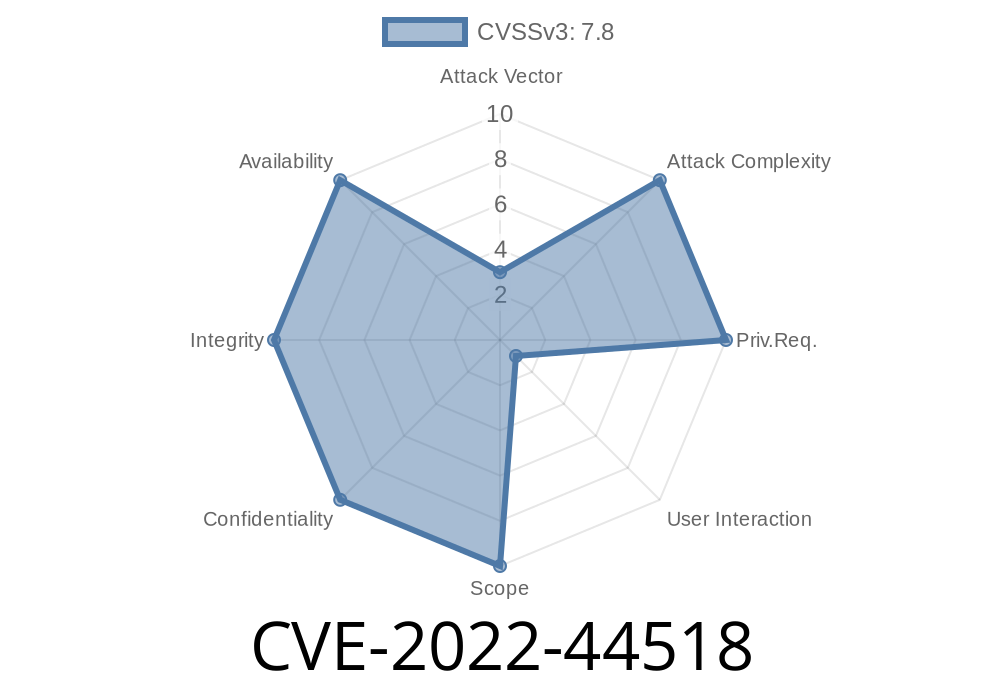Acrobat Reader DC is one of the most popular PDF readers used worldwide, but with popularity comes scrutiny—and, at times, serious security flaws. CVE-2022-44518 is a critical use-after-free vulnerability that puts users at risk for arbitrary code execution. If exploited, an attacker can run any code they want, as the current user, just by tricking someone into opening a specially crafted PDF file.
This post will break down what CVE-2022-44518 is, who’s affected, how the exploit works (with snippets and analysis), where you can find the official documentation, and what you should do to stay safe.
What is CVE-2022-44518?
CVE-2022-44518 is a vulnerability found in the following versions of Acrobat Reader DC (and earlier):
17.012.30205
It’s a use-after-free bug—a type of memory vulnerability that occurs when a program continues to use a memory location after it’s been freed (deleted). In this case, if someone opens a malicious PDF file, specially crafted to trigger this bug, the attacker can take control of Acrobat’s process and run arbitrary code.
Severity: Critical (arbitrary code execution)
User interaction: Required (victim must open a file)
Context: Current logged-in user
What’s a Use-After-Free?
A use-after-free happens when memory is released but then used again. If an attacker can predict or control what gets put in that memory afterward, they can hijack program flow.
Here’s a simple C example that illustrates the problem
#include <stdio.h>
#include <stdlib.h>
int* createPtr() {
int* p = malloc(sizeof(int));
*p = 42;
return p;
}
int main() {
int* myPtr = createPtr();
free(myPtr); // Memory released
printf("%d\n", *myPtr); // Use-after-free: memory might be reused!
return ;
}
In Acrobat Reader DC, similar problems can arise if the software incorrectly manages objects within a PDF, especially with complicated or intentionally malformed files.
How CVE-2022-44518 Can Be Exploited
The attacker crafts a malicious PDF with embedded objects (like JavaScript or annotations). When Acrobat tries to process these, it can inadvertently free an object and then use it again, opening the door for exploitation.
Proof of Concept (Pseudo-PDF JavaScript Exploit)
Below is a simplified version of what the logic could look like from an attacker's perspective (for educational use only):
// Inside a PDF’s JavaScript action
var maliciousObj = this.getAnnots({nPage:});
this.removeAnnot(, maliciousObj[].name);
// Acrobat's internal logic frees, then tries to use the same object
app.alert(maliciousObj[].name); // UAF - pointer now points to attacker-controlled data!
In practice, attackers embed binary payloads inside the PDF or exploit the process further using heap spraying in JavaScript, so when Acrobat reuses memory, execution is directed at attacker code.
Acrobat 2017 (17.012.30205 and earlier)
If you haven’t updated Acrobat since early 2022, you could be at risk.
Adobe Security Bulletin:
https://helpx.adobe.com/security/products/acrobat/apsb22-51.html
NIST National Vulnerability Database:
https://nvd.nist.gov/vuln/detail/CVE-2022-44518
Mitre CVE entry:
https://cve.mitre.org/cgi-bin/cvename.cgi?name=CVE-2022-44518
How to Protect Yourself
- Update Immediately: Adobe has patched this vulnerability. Update to the latest version from Adobe’s official site.
Be Wary of Unknown PDFs: Only open PDF files from people and sources you trust.
- Disable JavaScript in Acrobat: In preferences, disable JavaScript unless absolutely necessary (Edit > Preferences > JavaScript > Uncheck "Enable Acrobat JavaScript").
Conclusion
CVE-2022-44518 is a critical example of how simply viewing a document can put your computer—and your data—at risk. Understanding how use-after-free bugs work helps you appreciate the importance of keeping software updated and staying vigilant about suspicious attachments.
Please update your software and share this information to help others stay protected!
For further technical details and up-to-date exploit information, check out
- Adobe Security Bulletins
- NVD Listing for CVE-2022-44518
- Security Stack Exchange
*Stay safe and always keep your applications up-to-date!*
Timeline
Published on: 12/19/2024 00:15:06 UTC
